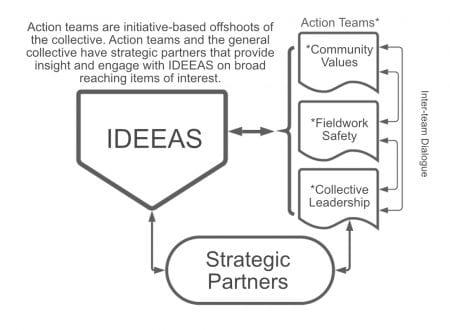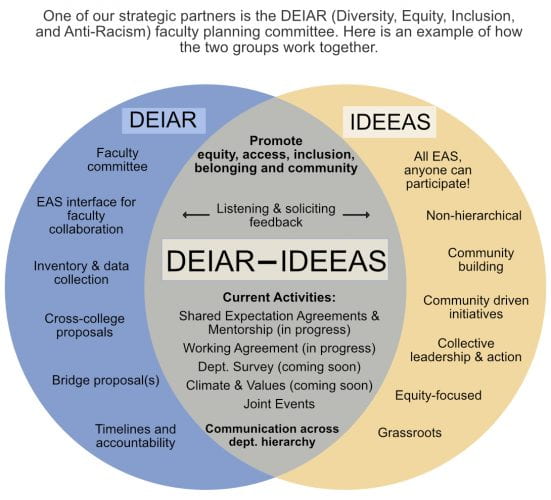Who We Are
Inclusion, Diversity, and Equity in Earth and Atmospheric Sciences, or IDEEAS, formed organically as a grassroots collective with a desire to improve cooperation and support among community members in our department ecosystem. Self-selected from the full cross-section of the department, IDEEAS comprises students, staff, researchers, pre-tenure and tenured faculty, emeriti, and alumni.
IDEEAS is a non-hierarchical group within the very hierarchical setting of academia. We formed IDEEAS to educate ourselves on inclusive practices and create a more visible, equity-focused culture in the department, with the experiences and perspectives of our personal and professional communities in mind.
Our Mission
Our mission is to foster inclusion, belonging, and community in EAS among students, administrative staff, research staff, faculty, professors emeriti, and alumni. We actively promote diversity, equity, inclusion, and access as core values. We promote these values by bringing equity, diversity, and inclusion learning opportunities to the EAS community and create frameworks to ensure equitable access to department educational, research, and professional opportunities. We will continue to foster an environment to cultivate respect for diverse backgrounds and perspectives.
How We Got Started
IDEEAS founders wanted to create an inclusive environment to foster the success and happiness of all current and future department members.
Historically, EAS has been a divided department. The two “sides” of our department – solid earth and atmospheric – formally merged two decades ago, and while it has been 20 years, in many ways we still operate as two entities, rather than as “One EAS.” We exist in two buildings, Snee Hall (on the Engineering quad) and Bradfield Hall (on the Ag quad), which we will vacate permanently when the atmospheric side of our department finally moves into Snee Hall in January 2021. IDEEAS and the formal department leadership are currently taking intentional steps to foster a cohesive, resilient community, greater than the sum of its predecessors.
Geoscientists are attempting to tackle the earth’s most complex problems. Diverse perspectives produce the most robust solutions, however, geoscience is the least diverse field in STEM [hyperlink to article on resources page]. It is important to generate conversations about social, historical, political, cultural, economic context and impact of geosciences as a field. We as geoscientists and allies can reimagine both what our work entails and how these lenses may inform and transform research questions and solutions.
The first IDEEAS event, a pizza party and facilitated conversation in Jan. 2020, drew ~60 attendees from across the department and received substantial supportive feedback. As national crises mounted in following months, IDEEAS organizers have been critically responsive, providing numerous opportunities for social connection during ongoing COVID19 isolation, and participating in the national discourse on race by organizing open community conversations on implicit bias and structural racism.
How We Operate
We strive to enact impactful, sustainable culture transformation within EAS. This includes how we communicate internally as a department and how we define our priorities as a community. Our work provides a model for disrupting traditional power structures while leveraging their influence to reimagine how an academic unit could and should function.
We provide a space to have important conversations and then take appropriate, collective action within the context of our department. The IDEEAS ethos rests on the premise that leadership is a dynamic process a group can enact collectively, rather than an intrinsic quality that an appointed individual exercises over followers.
Each IDEEAS project or initiative is organized around an action team, who collectively carry out a community-informed vision of the culture we would like to co-create with the rest of the department. Our commitment to collective leadership empowers constituencies (e.g., students, non-academic staff, post-docs) who have traditionally lacked a pathway to provide input or participate in department-level decision making.
IDEEAS events aim to foster social connection and community within the department, as well as intentional learning opportunities to promote critical reflection and discussion. Past and ongoing events include a well-attended kickoff party with facilitated conversation, a regular Justice, Equity, Diversity and Inclusion (JEDI) journal discussion, and community conversations about implicit bias and structural racism.
IDEEAS also partners more formally with leadership in EAS through directors of graduate study, faculty advisors, and through the newly formed Diversity, Equity, Inclusion, and Anti-Racism (DEIAR, pronounced “deer”) faculty committee. Formalizing these relationships is central to developing a sustainable ecosystem that will outlive IDEEAS’ founders. Our current working model, which differs from the traditional approach, establishes a working relationship on a project-by-project basis, and members from the IDEEAS collective join “action teams” to work with DEIAR and department leadership. We believe this model diffuses the pressure (and the politics) associated with having a single graduate student or post-doc liaison who interacts with faculty and IDEEAS. Instead, a team from IDEEAS works on a specific project within a well-defined timeline and scope.
How to Get Involved
- General meetings are open to members of the Cornell community, see our calendar for info on the next meeting.
- Contact us: IDEEAS@cornell.edu


